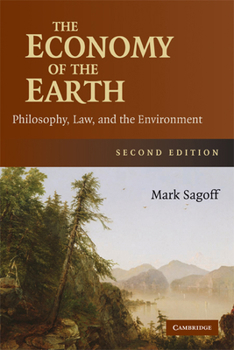The Economy of the Earth: Philosophy, Law, and the Environment
Select Format
Select Condition 
Book Overview
Mark Sagoff draws on the last twenty years of debate over the foundations of environmentalism in this comprehensive revision of The Economy of the Earth. Posing questions pertinent to consumption, cost-benefit analysis, the normative implications of neo-Darwinism, the role of the natural in national history, and the centrality of the concept of place in environmental ethics, he analyses social policy in relation to the environment, pollution, the...
Format:Paperback
Language:English
ISBN:0521687136
ISBN13:9780521687133
Release Date:December 2007
Publisher:Cambridge University Press
Length:280 Pages
Weight:0.89 lbs.
Dimensions:0.7" x 6.0" x 9.0"
Customer Reviews
3 ratings
Be careful
Published by Thriftbooks.com User , 15 years ago
Thompson is absolutely correct to be careful about different editions -- if you buy a used paperback, you need to be sure which edition it is. The property chapter cut from the 2nd edition is insightful, but the chapters added to the new edition keep it up with current environmental debates on ecosystem services and sciences. Be careful.
economy of earth
Published by Thriftbooks.com User , 15 years ago
In The Economy of the Earth: Philosophy, Law, and the Environment (New York: Cambridge University Press, c. 1988), Mark Sagoff urges us to develop stronger ethical and legal norms os as to preserve the environment through social regulation. Taking issue with those who would reduce all environmental issues to economics and its concern for commodities and profit/loss data, he argues "that these problems are primarily moral, aesthetic, cultural, and political and that they must be ad¬dressed in those terms" (p. 6). Those who mindlessly espouse the notion that "you can't legislate morality" might as well close Sagoff's book at page six, for that's exactly what he thinks we must do! Central to his endeavor is the task of dislodging "cost-benefit analysis" from the center of policy-making, law-shaping endeavors. Surely there are goods and services, entities and experiences, which cannot be measured by or reduced to dollars and cents! And surely such things have intrinsic worth which transcends personal preferences. To establish moral and legal weight for intangibles such as community bonds or scenic beauties, and to discover objective criteria for allegedly subjective moral judgments, is Sagoff's task. He does so, in part, because once "we accept the theory that values are subjective, that they are just 'wants,' we must also accept the idea that managers--whether they be therapists, lawyers, or cost-benefit analysts--are in the best position to handle them for us. We must also accept the idea that we all want the same thing, namely, the satisfaction of as many preferences as possible, taking their intensity into account" (p. 48). Sagoff rejects such utilitarianism because it so easily allows the welfare state to function with little regard for anything but physiological/economic concerns. "We cannot permit welfare economics to replace the moral function of public law. The antinomianism of cost-benefit analysis is not enough" (p. 49). There is, in fact, an important difference between preferences and judgments. To reduce moral judgments to economic preferences renders one (whether as a person or as a society) incapable of making decisions in accord with what should be done, whether or not it gives me (or us) pleasure. Natural "resources" such as timber have too frequently been parceled out unwisely, satisfying certain persons' or corporations' desires but illustrating poor long-range judgment. Allowing the "bottom line" to dictate environmental policies, ignoring the fact that precious scenes or wildlife or pure water have worth and dignity which cannot be reduced to money, forces us to forego making genuinely moral judgments. Conversely, when environmentalists champion wilderness preservation, they argue for its "cul¬tural importance and symbolic meaning," articulating "a conviction and not a desire" (p. 94). Sagoff strongly emphasizes the importance of this distinction. Some things are clearly right, other thin
Critique of cost-benefit analysis for environmental matters
Published by Thriftbooks.com User , 24 years ago
Prof. Sagoff demonstrates the problematic nature of an economic approach to environmental decisionmaking. Even granting that we could quantify environmental values in dollar terms, he raises the important question of why we would want to do such a thing. The author argues that questions of balancing environmental values against other "goods" should be decided in the public political arena, and not by reference to people's private willingness to pay. Somewhat puzzling is Sagoff's adherence to a utilitarian philosophy; I'm still waiting for someone to point out the obvious liberty and distributive-justice problems with cost-benefit analysis in the sphere of environmental regulation.






